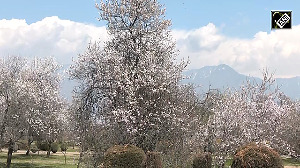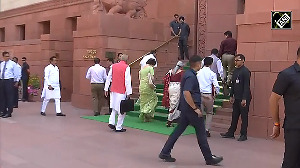A Pakistani judge on Saturday cancelled former premier Imran Khan's arrest warrants in the Toshakhana corruption case and allowed him to go home without indicting him, amidst clashes between his supporters and police outside the court complex in Islamabad.

Khan arrived at the Islamabad Judicial Complex from Lahore to appear before the court of Additional District and Sessions Judge Zafar Iqbal to attend proceedings on a complaint filed by the Election Commission of Pakistan for allegedly concealing details of gifts in his assets declarations.
Judge Iqbal after waiting for hours for the 70-year-old chief of the Pakistan Tehreek-e-Insaf (PTI) party to reach the court agreed with the suggestion by his lawyer to get the signature of the former premier on the attendance sheet in his vehicle to comply with the court orders of in-person presence.
The judge allowed Khan to go back to Lahore after marking his attendance outside the Islamabad Judicial Complex where he was set to be indicted in the Toshakhana case.
"The situation as it is, the hearing and appearance cannot proceed that is why all those who have gathered here should disperse after marking attendance. There is no need for shelling or pelting, the hearing cannot be held today," the judge was quoted as saying by Dawn newspaper.
Judge Iqbal also cancelled the arrest warrants issued against Khan in the Toshakhana case and adjourned the hearing till March 30 due to the chaos following clashes between police and PTI workers.
The people inside the courtroom were facing difficulties due to the effects of the teargas while PTI party workers pelted stones at the court complex.
Senior PTI leader Shah Mahmood Qureshi confirmed to the media that all legal formalities regarding Khan's appearance in the court had been fulfilled and he was leaving the premises. Thus, Khan went away without his indictment in the case.
Khan earlier reached the court premises but his efforts to reach the courtroom were thwarted due to the deteriorating law and order situation.
Khan had warned in a video message that he was expecting an attempt to arrest him.
Pemra -- the electronic media watchdog- had banned television coverage of the Judicial Complex and political rallies.
'Another day in life of Pakistan has passed without catastrophe. Narrow escape. Any major accident could have happened,' tweeted President Arif Alvi, who belongs to Khan's party.
Alvi called on all politicians to work together to take the country out of its current issues.
Meanwhile, Pakistan Muslim League-Nawaz Senior Vice President Maryam Nawaz quipped at Khan, saying he was a 'jackal who is scared of getting arrested which is why he is refusing to come outside of his car'.
Earlier, clashes erupted between security forces and Khan's supporters outside the judicial complex ahead of his appearance before the court.
Islamabad police chief Akbar Nasir Khan told the media that Khan's supporters resorted to violence, pelted stones at the police and also set on fire a police picket.
"Our force is tackling the situation with patience," he said, adding that Khan was just five minutes away from driving to the court.
Stringent security measures were implemented outside the judicial complex in Islamabad's G-11, where Khan appeared.
A large contingent of police was deployed to the area to provide security for Khan, who survived an assassination attempt in November last year.
Khan arrived in Islamabad from Lahore to appear before the court.
He was accompanied by his supporters in a convoy.
At least three vehicles in his convoy also met with an accident near the Kalar Kahar area on the M-2 motorway but no casualties were reported.
He appeared before Lahore high court on Friday and assured that he was ready to present himself on Saturday before Judge Iqbal handling the corruption case against him.
Khan has been in the dock for buying gifts, including an expensive Graff wristwatch, he received as the premier at a discounted price from the state depository called Toshakhana and selling them for profit.
Meanwhile, over 10,000 armed Punjab police personnel launched a major operation at Khan's Zaman Park residence in Lahore and arrested dozens of workers of his party and claimed to have seized weapons and petrol bombs, hours after he left for Islamabad.
The police launched the 'grand operation' at Khan's Zaman Park residence in Lahore and removed all camps, and barricades erected there by the party activists to prevent his arrest in the Toshakhana case.
During the operation, 61 workers of the party were arrested and about 10 PTI workers and three policemen were injured.
Khan's Lahore residence remained a battlefield between his party workers and police and Rangers for two days earlier this week over his 'arrest operation' in the case.
The PTI workers, however, succeeded in foiling his arrest attempt and the operation was halted on the Lahore high court's order earlier this week.
Inspector General Police Punjab Dr. Usman Anwar after the operation told a press conference that earlier the police had stopped the operation at Zaman Park on LHC order and PSL match.
"However, the court didn't stop us from taking action against those involved in attacking police. Today we launched an operation at 12 noon. We faced resistance from the PTI workers however we managed to control the situation and arrested 61 workers," he said.
The IGP said that 20 rifles, including Kalashnikov, and petrol bomb bottles have been recovered from Khan's residence.
Some bunkers were also built in the Zaman Park area, he said, adding that a case will be registered against Khan in this regard.
He said Khan's house had been raided after police got search warrants.
The cricketer-turned-politician was disqualified by the Election Commission of Pakistan (ECP) in October last year for not sharing details of the sales.
The top electoral body later filed a complaint with the district court to punish him, under criminal laws, for selling the gifts he had received as prime minister of the country.
Khan was ousted from power in April last year after losing a no-confidence vote, becoming the first Pakistani prime minister to be voted out by the National Assembly.











 © 2025
© 2025